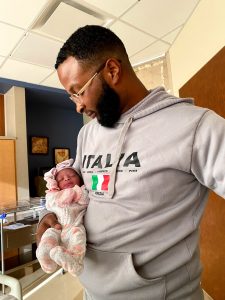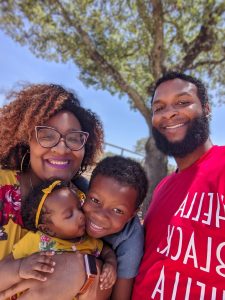
When I moved to San Antonio seven years ago, it was one of the biggest adventures I had ever embarked on—and one of the loneliest. I knew no one besides my husband—we moved here because of his job. In fact, I had never stepped foot in Texas, let alone San Antonio. Little did I know, I would be starting another big, scary adventure—a few months after we moved here, I became pregnant with our son. And just like the move, we were doing it alone. We had no family and friends around. It was just us.
As my belly grew, so did the feelings of despair. What was supposed to be a joyous time felt like the complete opposite. When it was time to give birth, it was nothing like I imagined. It was just the two of us. On the one hand, it brought us closer than ever before. We had to rely on each other. But I always imagined that my family and friends would be nearby and able to meet the baby. That wasn’t our reality. My dreams of a natural birth were shattered when after 17 hours of labor, I had an emergency C-section. Neither of us were prepared for the surgery, and we had no idea how it would impact my postpartum period.
Physically, I had a rough time recovering. I was distraught and devastated by the surgery and not being able to birth the way I wanted. I also struggled to breastfeed, and decided to exclusively pump for the first few months, which was a job in itself. To make matters worse, my husband had no paternity leave, so he was forced to go back to work two weeks after I had the baby. Yet again, I was alone with this new little person. I would go hours without eating, afraid to leave my son alone for even a second. I wouldn’t be able to do simple things like shower until my husband got home from work. It was a dark period for me.
I struggled so much after I had my son that I refused to even entertain the thought of having another child. My husband desperately wanted to have another baby, but I think he knew that things would have to be different if I was ever going to see another baby as a good thing and not the beginning of another dark period. I wasn’t officially diagnosed with postpartum depression, but I had many of the symptoms. They didn’t emerge until conveniently after I’d had my postpartum appointments. I had no one to talk to—I remember ignoring my phone and just watching the hours pass until my husband came home so I could have some form of interaction with another person who could talk back to me.
I didn’t really take the time to think about how hard this period must have been for my husband. He had to go back to work, knowing that I was struggling and not being able to do anything about it. Being back at work so soon after our son was born also meant that he initially struggled to connect with him. Paternity leave wasn’t something that I had even considered—I didn’t know any fathers who were able to take extensive time off after having children. I just always assumed that I would be home until I started grad school in the fall, and my husband would be back at work. But what this also meant is that because he had no paternity leave, he had to use all of his paid time and sick leave. So we had to cross our fingers that nothing else would happen for the rest of the year because he had no more time off.
I recognize the privilege that we had in that he was able to take off any time at all, and I didn’t have to rush back to work. Maternity leave is not a guaranteed option at jobs here in America, either (and I would eventually learn this the hard way when I became pregnant with my daughter).
My husband works in the tech industry, and some companies are starting to offer paternity leave to their employees. One day he decided to press his company about this, and months later, a paternity leave plan was put in place that also extended the leave available for mothers. I finally felt comfortable enough to consider having another baby. My husband’s paternity leave was extensive—he was able to be home for 12 weeks after our daughter was born.
This has shifted the postpartum period for me tremendously. He was able to offer much more help with her, which I definitely needed after a repeat C-section. Being home for 12 weeks meant he was also able to bond with her and connect with our son, giving me ample time to rest and recover. It gave him the mental reset that he needed, too. Pregnancy was rough for me, and it can also be tough on our partners, too. Going immediately back to work, with two kids to care for and a wife with limited mobility as she healed from surgery, would have been extremely rough for him. Having paternity leave allowed us to ease into becoming a family of four. It gave me as much time as I needed to breastfeed and to adequately heal from the surgery. This time around, we had a strong community made up of family and friends that were also able to support us both and care for our son while we were still in the hospital.

Paternity leave is an important link to a healthy postpartum period for both parents. It allows for both parents to have bonding time with the baby, and most importantly, gives the mom time to heal. Prioritizing paternity leave also recognizes the important role that fathers and partners have in their families. The idea that fathers are hands-off and not involved with their children is also supported by the absence of paternity leave at many jobs. That very important bonding time when a baby is first born is cut short when a parent has to be absent due to work. It can also cause strain and feelings of resentment for the parent that has to take on the childcare duties.
If we want to really prioritize healthy families from the start, we should consider universal parental leave. The birthing parent has unique needs that will require a longer time of recovery, but this also means that the other parent should have ample amount of time to assist in that recovery and to help with childcare. Parental leave should come with full salary paid for the duration of the leave so that the parent can truly focus on caring for their new baby and not have to worry about a disruption in their finances. If we truly care about families, we need both parents to have ample time at the beginning of the child’s life to bond with the baby and to adjust to becoming a new family.
Having my husband at home significantly impacted my postpartum healing—when he saw me slipping into moments of depression or anxiety he was able to spring into action. When my son needed one-on-one time we were able to switch off and handle each child. Those extremely long nights when she was a newborn were made easier because we were able to both care for her. This was crucial at the beginning because my C-section recovery made things very difficult. My husband’s paternity leave made my postpartum period one of joy and hope, and I am a better person and mother because I had the time to ease into my new role, fully supported.











